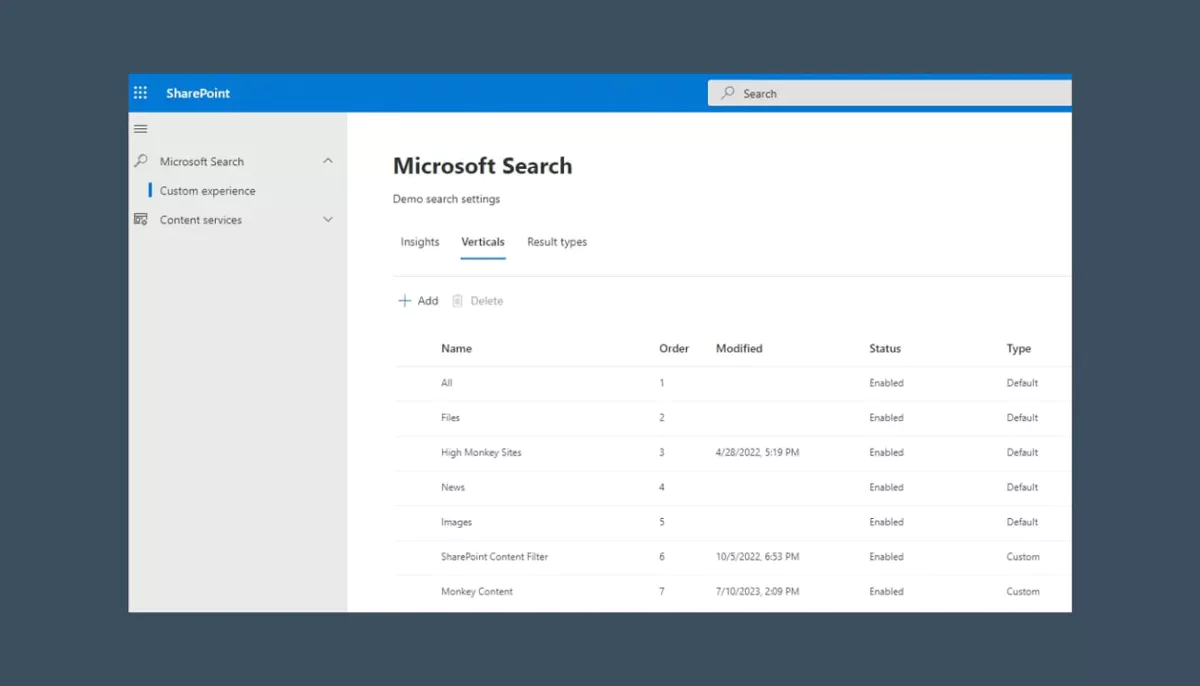
BLOG
Making Microsoft Search results your own with Custom Verticals
Microsoft Search's Custom Verticals enhance search precision within an organization's 365 environment. This article walks readers through the strategy, process, and potential pitfalls around using custom verticals in their own organizations and helps provide a roadmap for success.
March 17, 2025
Reading time: 10 min
|
Content & Search
Where Microsoft Search is one of the most advanced internal search engines ever developed, even the best can be overwhelmed with the sheer amount of data and content that exists in a typical organizational 365 environment. As with previous SharePoint-centric search solutions, Microsoft continues to add valuable additions to help organizations sift through immense amounts of content and provide end users with a more streamlined search experience.
This second article of the series will explore another facet of Microsoft Search, custom verticals. Custom verticals give administrators the ability to deliver a more precise, context-specific search experience. This allows end users to refine and direct their searches within specific content, datasets, locations, and patterns. Initially only offered to those customers who leveraged Graph Search Connectors, custom verticals have recently expanded to include the ability to target SharePoint structure and content as well. For those familiar with search scopes or result sets in SharePoint Classic Search, verticals are their natural replacement and offer the same flexibility and scalability to meet most organizational needs.
Using Custom Verticals in Microsoft Search
Using custom verticals in an organizational search strategy is one of the more straightforward implementations inside of Microsoft Search. Where it is easier to implement than many other search components, it still takes a solid level of planning to implement verticals that are both robust and useful to end users.The true magic of custom verticals is their ability to narrow down the scope of search results to more specifically target unique findability needs and provide a more tailored search process. In planning out the verticals, an organization needs to understand the needs of its people and determine how to best create a targeted results query. Much of the effort will be a lot of trial and error, requiring administrators and search experts to determine the best way to return the results which will provide the greatest opportunity for success. Where there are many ways to determine what kind of verticals should be created, below is a short list of starting points to help in determining what will provide the most benefits.
- Review Microsoft and Classic search logs to identify what people are truly searching for, including what searches are being performed successfully. Learning from the successes and failures of current search will provide invaluable information to identify verticals which could provide an immediate benefit.
- Identify people in the organization that own processes currently managed inside SharePoint or Team s sites, determining what is typically needed to be found and how a custom vertical could support their day-to-day work.
- Perform search workshops with organizational stakeholders and end users to understand findability pain points and how more customized results could help.
- Does all the content exist in a certain location(s)? This could be content in SharePoint site, library, list, or individual folders.
- Does the content have elements that are similar? This could include similar words in the content, naming structures, types of documents, custom metadata or ownership. If there is a piece of data that is stored about content in your SharePoint environment, it will most likely be available to assist in narrowing down results.
- Does the content support some kind of organizational process? This could include different departmental processes, HR-related activities, or leadership initiatives. Creating custom verticals that support specific internal functions can often be one of the significant ways to increase overall search success.
Administrators are provided with an easy-to-use interface to create custom verticals. Below is a video walkthrough of the step-by-step creation process.
Important Caveats
Where custom verticals can be an important part of an organizations’ overall search strategy, there are some important aspects to consider during implementation that may affect the decision-making process.- Currently, custom verticals can only be targeted towards SharePoint and Graph Search Connector content. Where being able to target other types of content, such as Teams conversations, will eventually happen, the current scope is limited.
- There is no way to evaluate queries or filters during the creation process. Unlike classic SharePoint search, where administrators could test queries while building, testing will need to occur by live deploying and testing against live data. This will cause issues for some organizations as end users will not be restricted from using the verticals that are not fully vetted.
- After a custom vertical has been created and enabled, there is not a consistent timing on when the vertical will become available to the search experience. Often it can take up to 24 hours before the new vertical will appear. This may cause a lot of challenges for most organizations, especially during initial deployment and testing. A vertical that is not working will have to be edited and redeployed, with a potential 24-hour waiting period needing to occur between each iteration.
Latest Blogs

| CMS & Custom Development
Using AJAX and MVC for Filtering and Paging a Directory
Learn how to build a dynamic resource directory with AJAX and MVC, featuring filtering and paging for a seamless user experience.
June 5, 2025
Reading time: 8 min

| Inclusive Design
Why Accessibility Isn’t Optional: Celebrating GAAD at High Monkey
Recognizing Global Accessibility Awareness Day with resources, insights, and episodes from our podcast that promote inclusive digital experiences.
May 15, 2025
Reading time: 3 min

| News
High Monkey at ACCELERATE 25
High Monkey had a blast at ACCELERATE 25! See what we shared, who we met, and how we’re helping credit unions improve their digital experiences.
April 24, 2025
Reading time: 2 min
Your success story starts here
Contact us for a free consultation, and let’s work together to build a strategic plan that tackles your challenges and lifts your organization to a new level.

